Health Literacy and Diabetes Management: A Nursing Assignment Report
VerifiedAdded on 2021/05/27
|9
|2234
|19
Report
AI Summary
This nursing assignment report delves into the critical role of health literacy in diabetes management. It begins with a research question exploring how patient education can improve the health of individuals with diabetes, highlighting the prevalence of health illiteracy among diabetic patients and its impact on their ability to understand and manage their condition. The report then reviews the literature, examining several studies that investigate the effectiveness of health literacy interventions and self-management strategies. These studies include quasi-experimental research in Sudan, a qualitative analysis of a diet control program in the UK, and an analysis of Diabetes Self-Management Education (DSME) programs across multiple countries. The findings consistently underscore the importance of health literacy in enabling patients to make informed decisions about their diet, lifestyle, and medication adherence, ultimately leading to better health outcomes. The report also provides recommendations for future research, addressing the limitations of previous studies, such as small sample sizes and reliance on questionnaires, and suggesting the integration of medical interventions and face-to-face interviews to obtain more comprehensive and unbiased data. The report concludes by emphasizing the significance of health literacy in empowering patients to effectively manage their diabetes and improve their overall well-being.
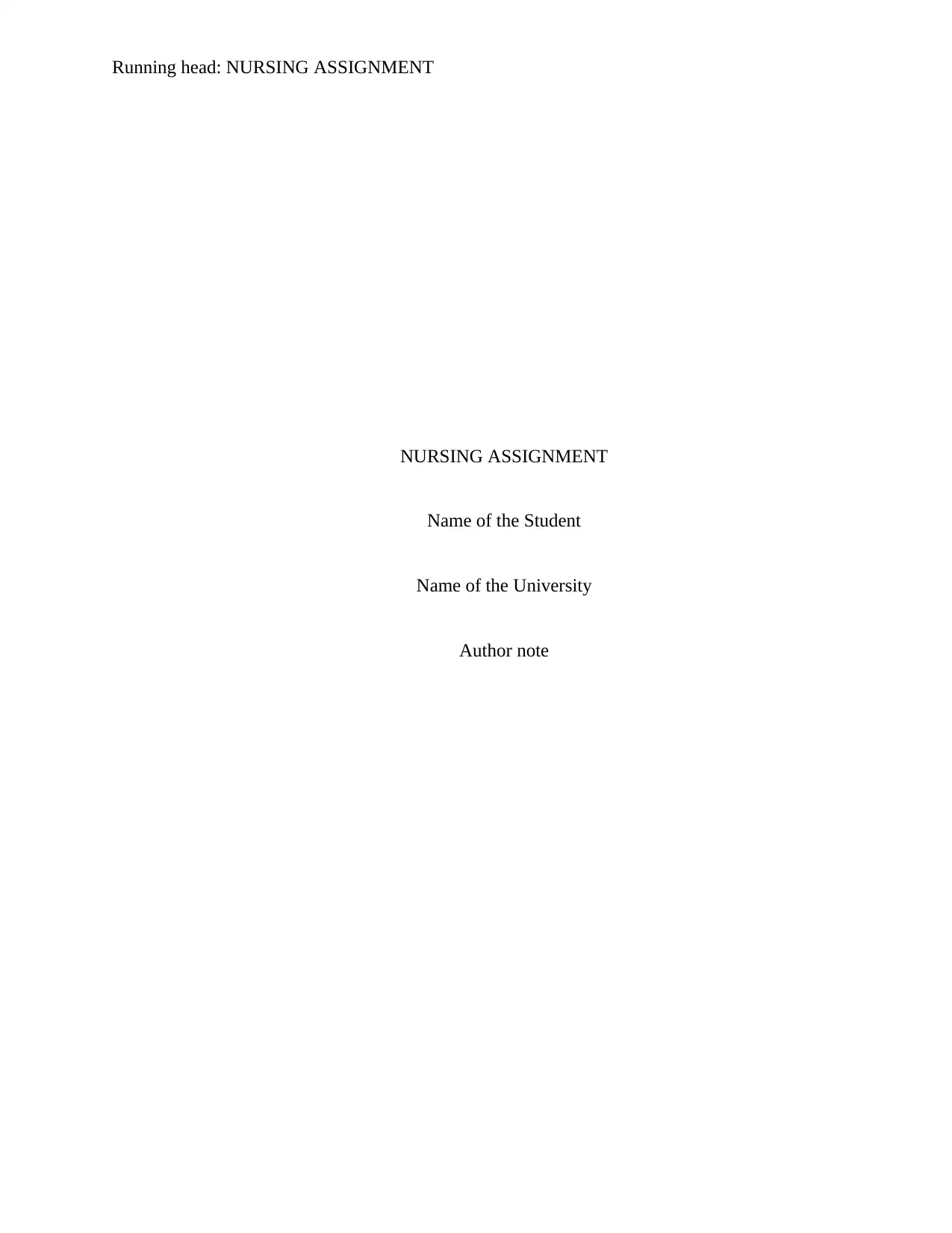
Running head: NURSING ASSIGNMENT
NURSING ASSIGNMENT
Name of the Student
Name of the University
Author note
NURSING ASSIGNMENT
Name of the Student
Name of the University
Author note
Paraphrase This Document
Need a fresh take? Get an instant paraphrase of this document with our AI Paraphraser
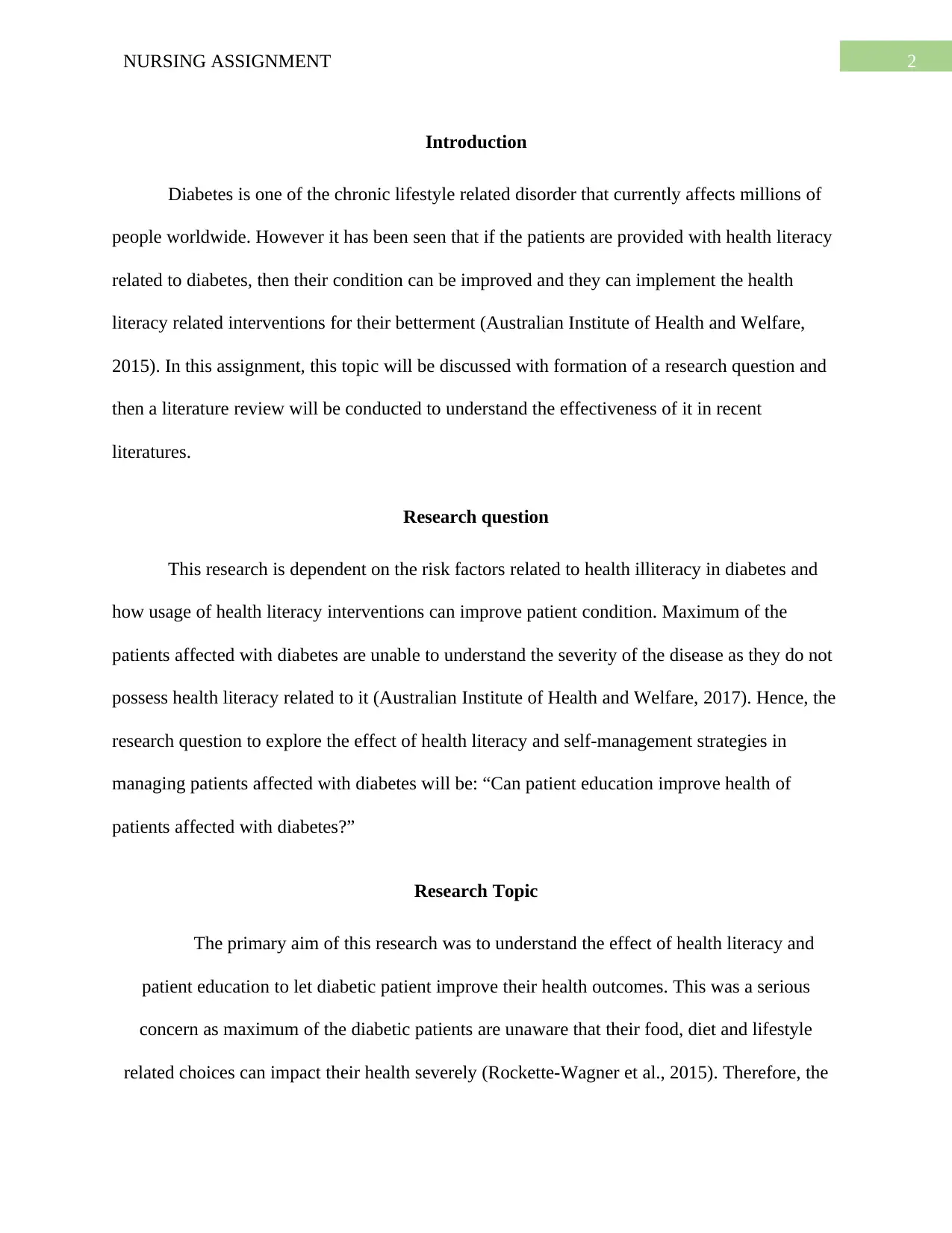
2NURSING ASSIGNMENT
Introduction
Diabetes is one of the chronic lifestyle related disorder that currently affects millions of
people worldwide. However it has been seen that if the patients are provided with health literacy
related to diabetes, then their condition can be improved and they can implement the health
literacy related interventions for their betterment (Australian Institute of Health and Welfare,
2015). In this assignment, this topic will be discussed with formation of a research question and
then a literature review will be conducted to understand the effectiveness of it in recent
literatures.
Research question
This research is dependent on the risk factors related to health illiteracy in diabetes and
how usage of health literacy interventions can improve patient condition. Maximum of the
patients affected with diabetes are unable to understand the severity of the disease as they do not
possess health literacy related to it (Australian Institute of Health and Welfare, 2017). Hence, the
research question to explore the effect of health literacy and self-management strategies in
managing patients affected with diabetes will be: “Can patient education improve health of
patients affected with diabetes?”
Research Topic
The primary aim of this research was to understand the effect of health literacy and
patient education to let diabetic patient improve their health outcomes. This was a serious
concern as maximum of the diabetic patients are unaware that their food, diet and lifestyle
related choices can impact their health severely (Rockette-Wagner et al., 2015). Therefore, the
Introduction
Diabetes is one of the chronic lifestyle related disorder that currently affects millions of
people worldwide. However it has been seen that if the patients are provided with health literacy
related to diabetes, then their condition can be improved and they can implement the health
literacy related interventions for their betterment (Australian Institute of Health and Welfare,
2015). In this assignment, this topic will be discussed with formation of a research question and
then a literature review will be conducted to understand the effectiveness of it in recent
literatures.
Research question
This research is dependent on the risk factors related to health illiteracy in diabetes and
how usage of health literacy interventions can improve patient condition. Maximum of the
patients affected with diabetes are unable to understand the severity of the disease as they do not
possess health literacy related to it (Australian Institute of Health and Welfare, 2017). Hence, the
research question to explore the effect of health literacy and self-management strategies in
managing patients affected with diabetes will be: “Can patient education improve health of
patients affected with diabetes?”
Research Topic
The primary aim of this research was to understand the effect of health literacy and
patient education to let diabetic patient improve their health outcomes. This was a serious
concern as maximum of the diabetic patients are unaware that their food, diet and lifestyle
related choices can impact their health severely (Rockette-Wagner et al., 2015). Therefore, the
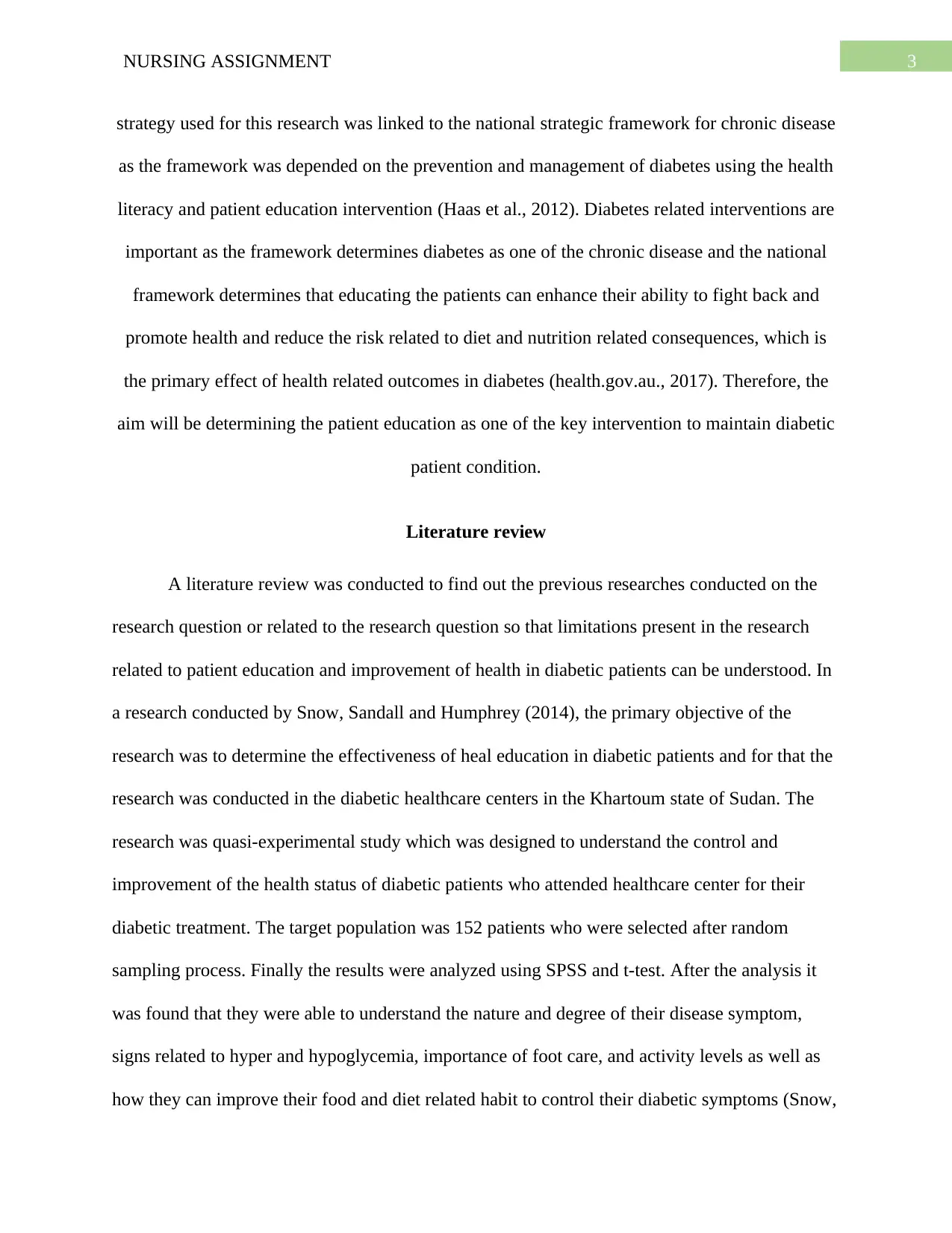
3NURSING ASSIGNMENT
strategy used for this research was linked to the national strategic framework for chronic disease
as the framework was depended on the prevention and management of diabetes using the health
literacy and patient education intervention (Haas et al., 2012). Diabetes related interventions are
important as the framework determines diabetes as one of the chronic disease and the national
framework determines that educating the patients can enhance their ability to fight back and
promote health and reduce the risk related to diet and nutrition related consequences, which is
the primary effect of health related outcomes in diabetes (health.gov.au., 2017). Therefore, the
aim will be determining the patient education as one of the key intervention to maintain diabetic
patient condition.
Literature review
A literature review was conducted to find out the previous researches conducted on the
research question or related to the research question so that limitations present in the research
related to patient education and improvement of health in diabetic patients can be understood. In
a research conducted by Snow, Sandall and Humphrey (2014), the primary objective of the
research was to determine the effectiveness of heal education in diabetic patients and for that the
research was conducted in the diabetic healthcare centers in the Khartoum state of Sudan. The
research was quasi-experimental study which was designed to understand the control and
improvement of the health status of diabetic patients who attended healthcare center for their
diabetic treatment. The target population was 152 patients who were selected after random
sampling process. Finally the results were analyzed using SPSS and t-test. After the analysis it
was found that they were able to understand the nature and degree of their disease symptom,
signs related to hyper and hypoglycemia, importance of foot care, and activity levels as well as
how they can improve their food and diet related habit to control their diabetic symptoms (Snow,
strategy used for this research was linked to the national strategic framework for chronic disease
as the framework was depended on the prevention and management of diabetes using the health
literacy and patient education intervention (Haas et al., 2012). Diabetes related interventions are
important as the framework determines diabetes as one of the chronic disease and the national
framework determines that educating the patients can enhance their ability to fight back and
promote health and reduce the risk related to diet and nutrition related consequences, which is
the primary effect of health related outcomes in diabetes (health.gov.au., 2017). Therefore, the
aim will be determining the patient education as one of the key intervention to maintain diabetic
patient condition.
Literature review
A literature review was conducted to find out the previous researches conducted on the
research question or related to the research question so that limitations present in the research
related to patient education and improvement of health in diabetic patients can be understood. In
a research conducted by Snow, Sandall and Humphrey (2014), the primary objective of the
research was to determine the effectiveness of heal education in diabetic patients and for that the
research was conducted in the diabetic healthcare centers in the Khartoum state of Sudan. The
research was quasi-experimental study which was designed to understand the control and
improvement of the health status of diabetic patients who attended healthcare center for their
diabetic treatment. The target population was 152 patients who were selected after random
sampling process. Finally the results were analyzed using SPSS and t-test. After the analysis it
was found that they were able to understand the nature and degree of their disease symptom,
signs related to hyper and hypoglycemia, importance of foot care, and activity levels as well as
how they can improve their food and diet related habit to control their diabetic symptoms (Snow,
⊘ This is a preview!⊘
Do you want full access?
Subscribe today to unlock all pages.

Trusted by 1+ million students worldwide
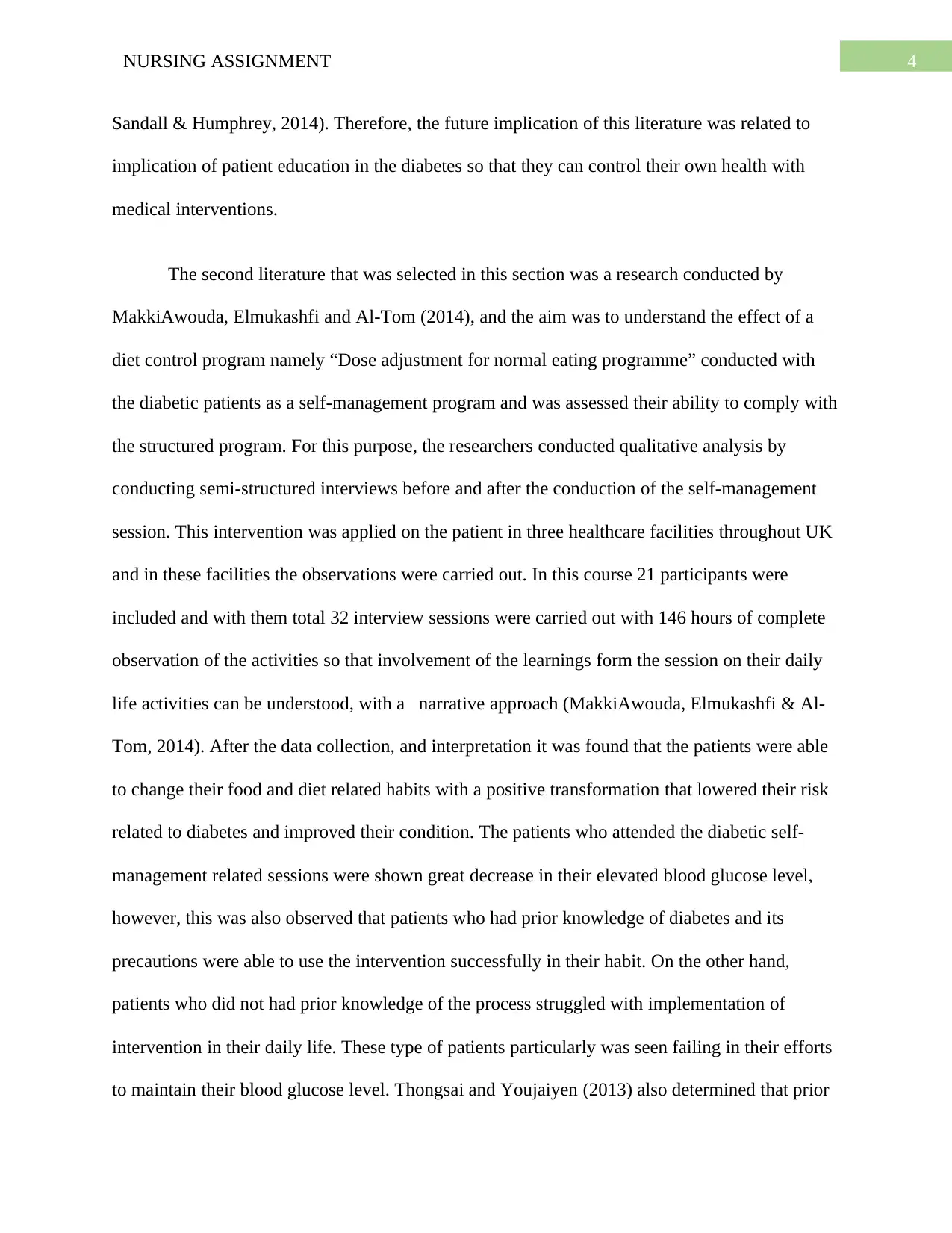
4NURSING ASSIGNMENT
Sandall & Humphrey, 2014). Therefore, the future implication of this literature was related to
implication of patient education in the diabetes so that they can control their own health with
medical interventions.
The second literature that was selected in this section was a research conducted by
MakkiAwouda, Elmukashfi and Al-Tom (2014), and the aim was to understand the effect of a
diet control program namely “Dose adjustment for normal eating programme” conducted with
the diabetic patients as a self-management program and was assessed their ability to comply with
the structured program. For this purpose, the researchers conducted qualitative analysis by
conducting semi-structured interviews before and after the conduction of the self-management
session. This intervention was applied on the patient in three healthcare facilities throughout UK
and in these facilities the observations were carried out. In this course 21 participants were
included and with them total 32 interview sessions were carried out with 146 hours of complete
observation of the activities so that involvement of the learnings form the session on their daily
life activities can be understood, with a narrative approach (MakkiAwouda, Elmukashfi & Al-
Tom, 2014). After the data collection, and interpretation it was found that the patients were able
to change their food and diet related habits with a positive transformation that lowered their risk
related to diabetes and improved their condition. The patients who attended the diabetic self-
management related sessions were shown great decrease in their elevated blood glucose level,
however, this was also observed that patients who had prior knowledge of diabetes and its
precautions were able to use the intervention successfully in their habit. On the other hand,
patients who did not had prior knowledge of the process struggled with implementation of
intervention in their daily life. These type of patients particularly was seen failing in their efforts
to maintain their blood glucose level. Thongsai and Youjaiyen (2013) also determined that prior
Sandall & Humphrey, 2014). Therefore, the future implication of this literature was related to
implication of patient education in the diabetes so that they can control their own health with
medical interventions.
The second literature that was selected in this section was a research conducted by
MakkiAwouda, Elmukashfi and Al-Tom (2014), and the aim was to understand the effect of a
diet control program namely “Dose adjustment for normal eating programme” conducted with
the diabetic patients as a self-management program and was assessed their ability to comply with
the structured program. For this purpose, the researchers conducted qualitative analysis by
conducting semi-structured interviews before and after the conduction of the self-management
session. This intervention was applied on the patient in three healthcare facilities throughout UK
and in these facilities the observations were carried out. In this course 21 participants were
included and with them total 32 interview sessions were carried out with 146 hours of complete
observation of the activities so that involvement of the learnings form the session on their daily
life activities can be understood, with a narrative approach (MakkiAwouda, Elmukashfi & Al-
Tom, 2014). After the data collection, and interpretation it was found that the patients were able
to change their food and diet related habits with a positive transformation that lowered their risk
related to diabetes and improved their condition. The patients who attended the diabetic self-
management related sessions were shown great decrease in their elevated blood glucose level,
however, this was also observed that patients who had prior knowledge of diabetes and its
precautions were able to use the intervention successfully in their habit. On the other hand,
patients who did not had prior knowledge of the process struggled with implementation of
intervention in their daily life. These type of patients particularly was seen failing in their efforts
to maintain their blood glucose level. Thongsai and Youjaiyen (2013) also determined that prior
Paraphrase This Document
Need a fresh take? Get an instant paraphrase of this document with our AI Paraphraser
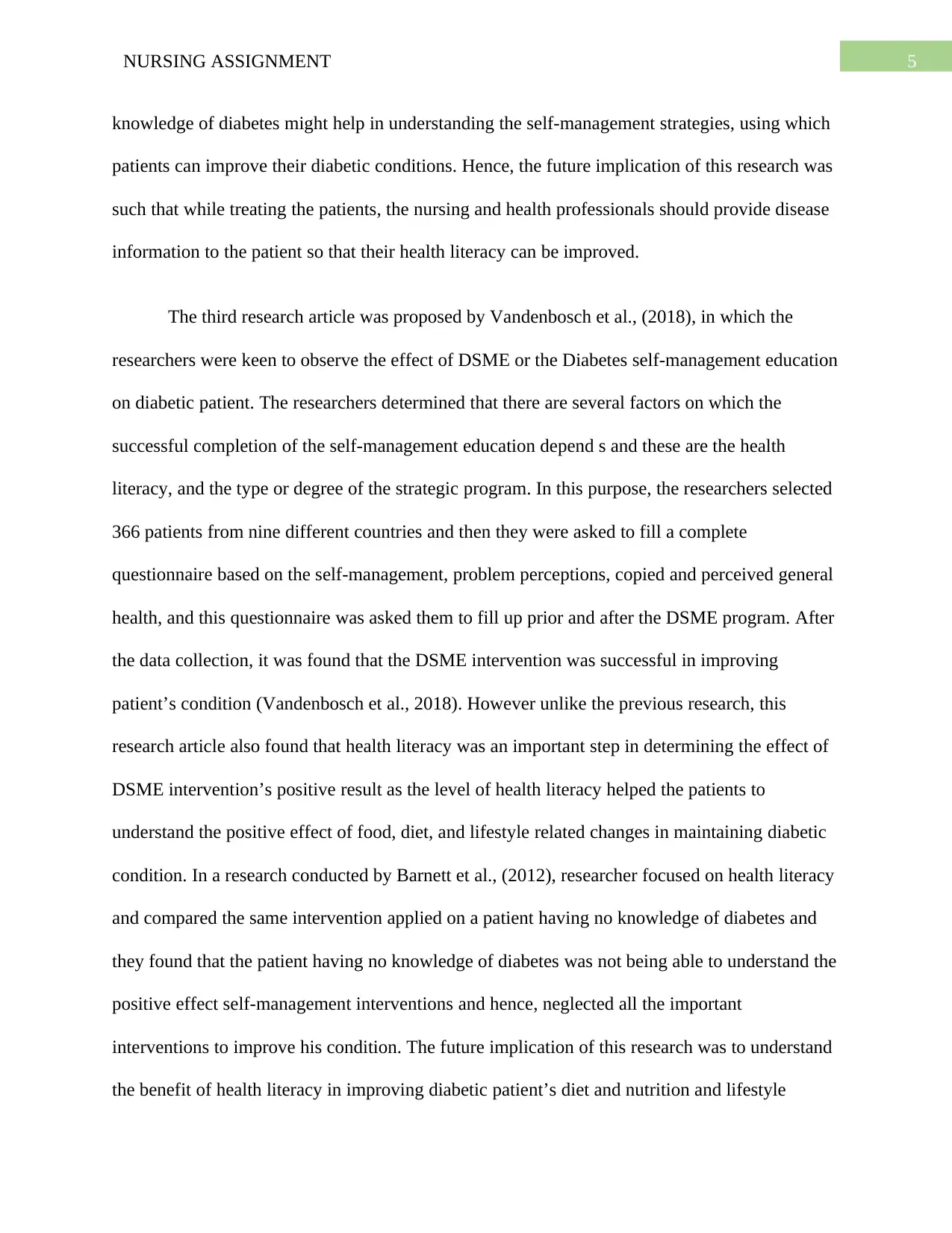
5NURSING ASSIGNMENT
knowledge of diabetes might help in understanding the self-management strategies, using which
patients can improve their diabetic conditions. Hence, the future implication of this research was
such that while treating the patients, the nursing and health professionals should provide disease
information to the patient so that their health literacy can be improved.
The third research article was proposed by Vandenbosch et al., (2018), in which the
researchers were keen to observe the effect of DSME or the Diabetes self-management education
on diabetic patient. The researchers determined that there are several factors on which the
successful completion of the self-management education depend s and these are the health
literacy, and the type or degree of the strategic program. In this purpose, the researchers selected
366 patients from nine different countries and then they were asked to fill a complete
questionnaire based on the self-management, problem perceptions, copied and perceived general
health, and this questionnaire was asked them to fill up prior and after the DSME program. After
the data collection, it was found that the DSME intervention was successful in improving
patient’s condition (Vandenbosch et al., 2018). However unlike the previous research, this
research article also found that health literacy was an important step in determining the effect of
DSME intervention’s positive result as the level of health literacy helped the patients to
understand the positive effect of food, diet, and lifestyle related changes in maintaining diabetic
condition. In a research conducted by Barnett et al., (2012), researcher focused on health literacy
and compared the same intervention applied on a patient having no knowledge of diabetes and
they found that the patient having no knowledge of diabetes was not being able to understand the
positive effect self-management interventions and hence, neglected all the important
interventions to improve his condition. The future implication of this research was to understand
the benefit of health literacy in improving diabetic patient’s diet and nutrition and lifestyle
knowledge of diabetes might help in understanding the self-management strategies, using which
patients can improve their diabetic conditions. Hence, the future implication of this research was
such that while treating the patients, the nursing and health professionals should provide disease
information to the patient so that their health literacy can be improved.
The third research article was proposed by Vandenbosch et al., (2018), in which the
researchers were keen to observe the effect of DSME or the Diabetes self-management education
on diabetic patient. The researchers determined that there are several factors on which the
successful completion of the self-management education depend s and these are the health
literacy, and the type or degree of the strategic program. In this purpose, the researchers selected
366 patients from nine different countries and then they were asked to fill a complete
questionnaire based on the self-management, problem perceptions, copied and perceived general
health, and this questionnaire was asked them to fill up prior and after the DSME program. After
the data collection, it was found that the DSME intervention was successful in improving
patient’s condition (Vandenbosch et al., 2018). However unlike the previous research, this
research article also found that health literacy was an important step in determining the effect of
DSME intervention’s positive result as the level of health literacy helped the patients to
understand the positive effect of food, diet, and lifestyle related changes in maintaining diabetic
condition. In a research conducted by Barnett et al., (2012), researcher focused on health literacy
and compared the same intervention applied on a patient having no knowledge of diabetes and
they found that the patient having no knowledge of diabetes was not being able to understand the
positive effect self-management interventions and hence, neglected all the important
interventions to improve his condition. The future implication of this research was to understand
the benefit of health literacy in improving diabetic patient’s diet and nutrition and lifestyle
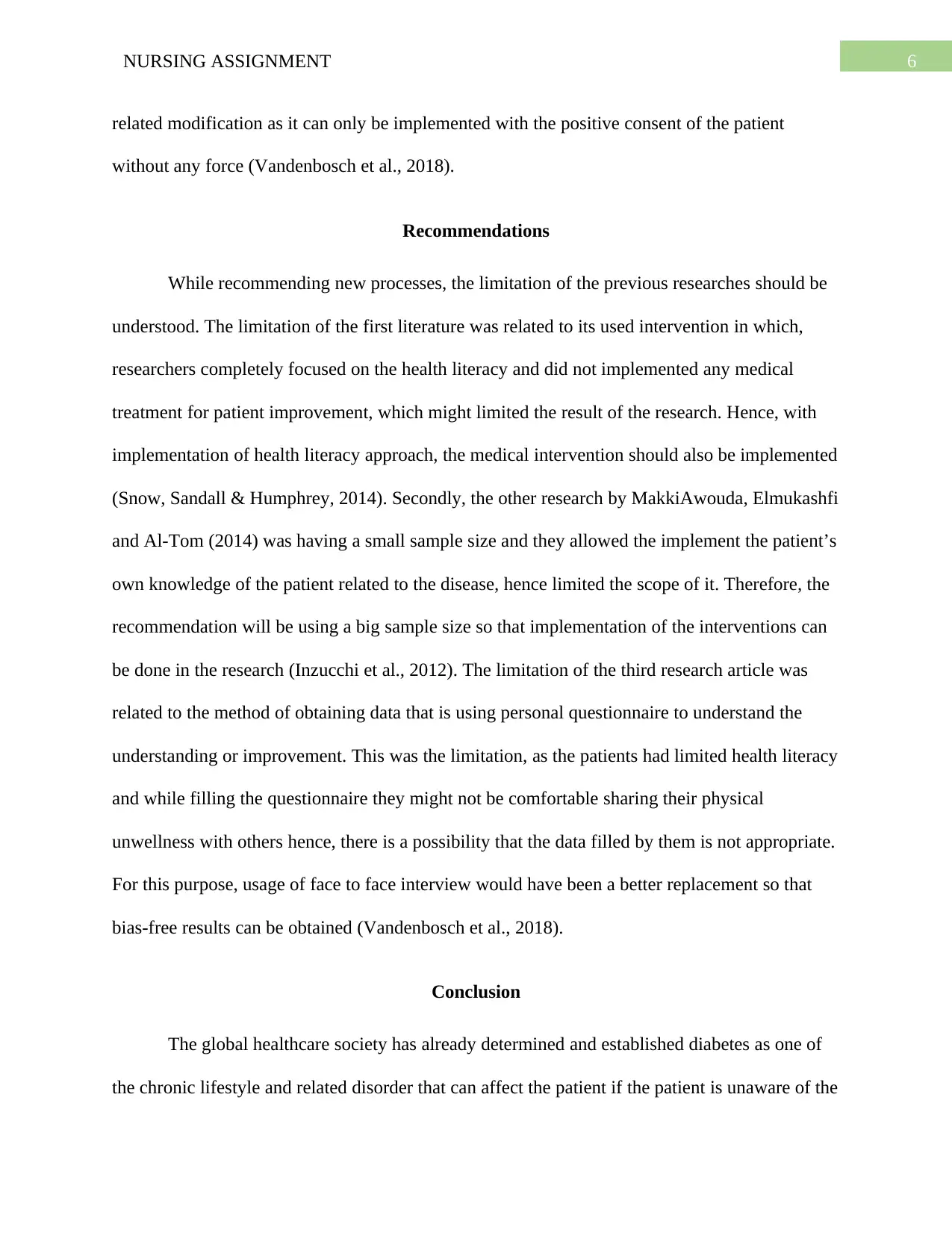
6NURSING ASSIGNMENT
related modification as it can only be implemented with the positive consent of the patient
without any force (Vandenbosch et al., 2018).
Recommendations
While recommending new processes, the limitation of the previous researches should be
understood. The limitation of the first literature was related to its used intervention in which,
researchers completely focused on the health literacy and did not implemented any medical
treatment for patient improvement, which might limited the result of the research. Hence, with
implementation of health literacy approach, the medical intervention should also be implemented
(Snow, Sandall & Humphrey, 2014). Secondly, the other research by MakkiAwouda, Elmukashfi
and Al-Tom (2014) was having a small sample size and they allowed the implement the patient’s
own knowledge of the patient related to the disease, hence limited the scope of it. Therefore, the
recommendation will be using a big sample size so that implementation of the interventions can
be done in the research (Inzucchi et al., 2012). The limitation of the third research article was
related to the method of obtaining data that is using personal questionnaire to understand the
understanding or improvement. This was the limitation, as the patients had limited health literacy
and while filling the questionnaire they might not be comfortable sharing their physical
unwellness with others hence, there is a possibility that the data filled by them is not appropriate.
For this purpose, usage of face to face interview would have been a better replacement so that
bias-free results can be obtained (Vandenbosch et al., 2018).
Conclusion
The global healthcare society has already determined and established diabetes as one of
the chronic lifestyle and related disorder that can affect the patient if the patient is unaware of the
related modification as it can only be implemented with the positive consent of the patient
without any force (Vandenbosch et al., 2018).
Recommendations
While recommending new processes, the limitation of the previous researches should be
understood. The limitation of the first literature was related to its used intervention in which,
researchers completely focused on the health literacy and did not implemented any medical
treatment for patient improvement, which might limited the result of the research. Hence, with
implementation of health literacy approach, the medical intervention should also be implemented
(Snow, Sandall & Humphrey, 2014). Secondly, the other research by MakkiAwouda, Elmukashfi
and Al-Tom (2014) was having a small sample size and they allowed the implement the patient’s
own knowledge of the patient related to the disease, hence limited the scope of it. Therefore, the
recommendation will be using a big sample size so that implementation of the interventions can
be done in the research (Inzucchi et al., 2012). The limitation of the third research article was
related to the method of obtaining data that is using personal questionnaire to understand the
understanding or improvement. This was the limitation, as the patients had limited health literacy
and while filling the questionnaire they might not be comfortable sharing their physical
unwellness with others hence, there is a possibility that the data filled by them is not appropriate.
For this purpose, usage of face to face interview would have been a better replacement so that
bias-free results can be obtained (Vandenbosch et al., 2018).
Conclusion
The global healthcare society has already determined and established diabetes as one of
the chronic lifestyle and related disorder that can affect the patient if the patient is unaware of the
⊘ This is a preview!⊘
Do you want full access?
Subscribe today to unlock all pages.

Trusted by 1+ million students worldwide
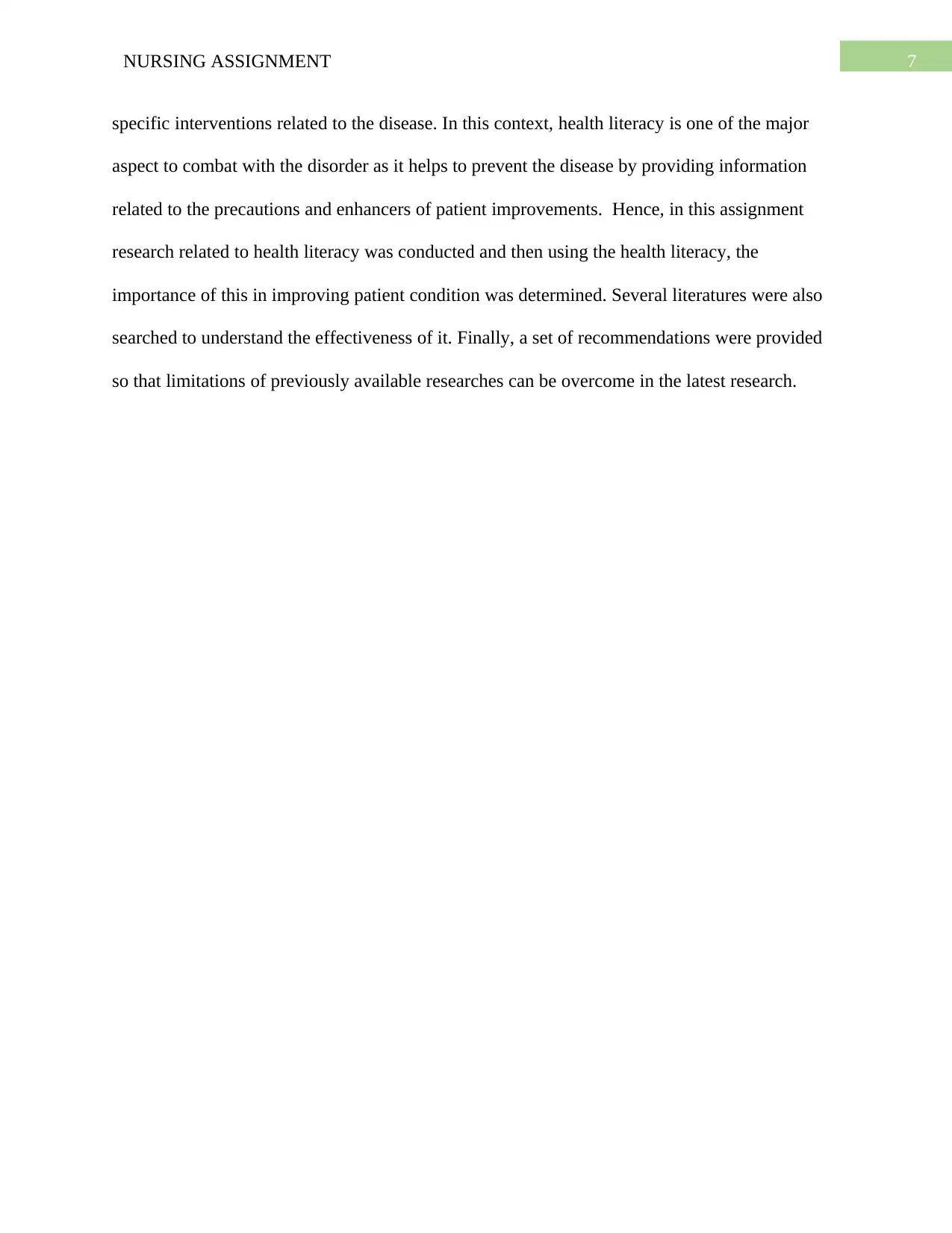
7NURSING ASSIGNMENT
specific interventions related to the disease. In this context, health literacy is one of the major
aspect to combat with the disorder as it helps to prevent the disease by providing information
related to the precautions and enhancers of patient improvements. Hence, in this assignment
research related to health literacy was conducted and then using the health literacy, the
importance of this in improving patient condition was determined. Several literatures were also
searched to understand the effectiveness of it. Finally, a set of recommendations were provided
so that limitations of previously available researches can be overcome in the latest research.
specific interventions related to the disease. In this context, health literacy is one of the major
aspect to combat with the disorder as it helps to prevent the disease by providing information
related to the precautions and enhancers of patient improvements. Hence, in this assignment
research related to health literacy was conducted and then using the health literacy, the
importance of this in improving patient condition was determined. Several literatures were also
searched to understand the effectiveness of it. Finally, a set of recommendations were provided
so that limitations of previously available researches can be overcome in the latest research.
Paraphrase This Document
Need a fresh take? Get an instant paraphrase of this document with our AI Paraphraser
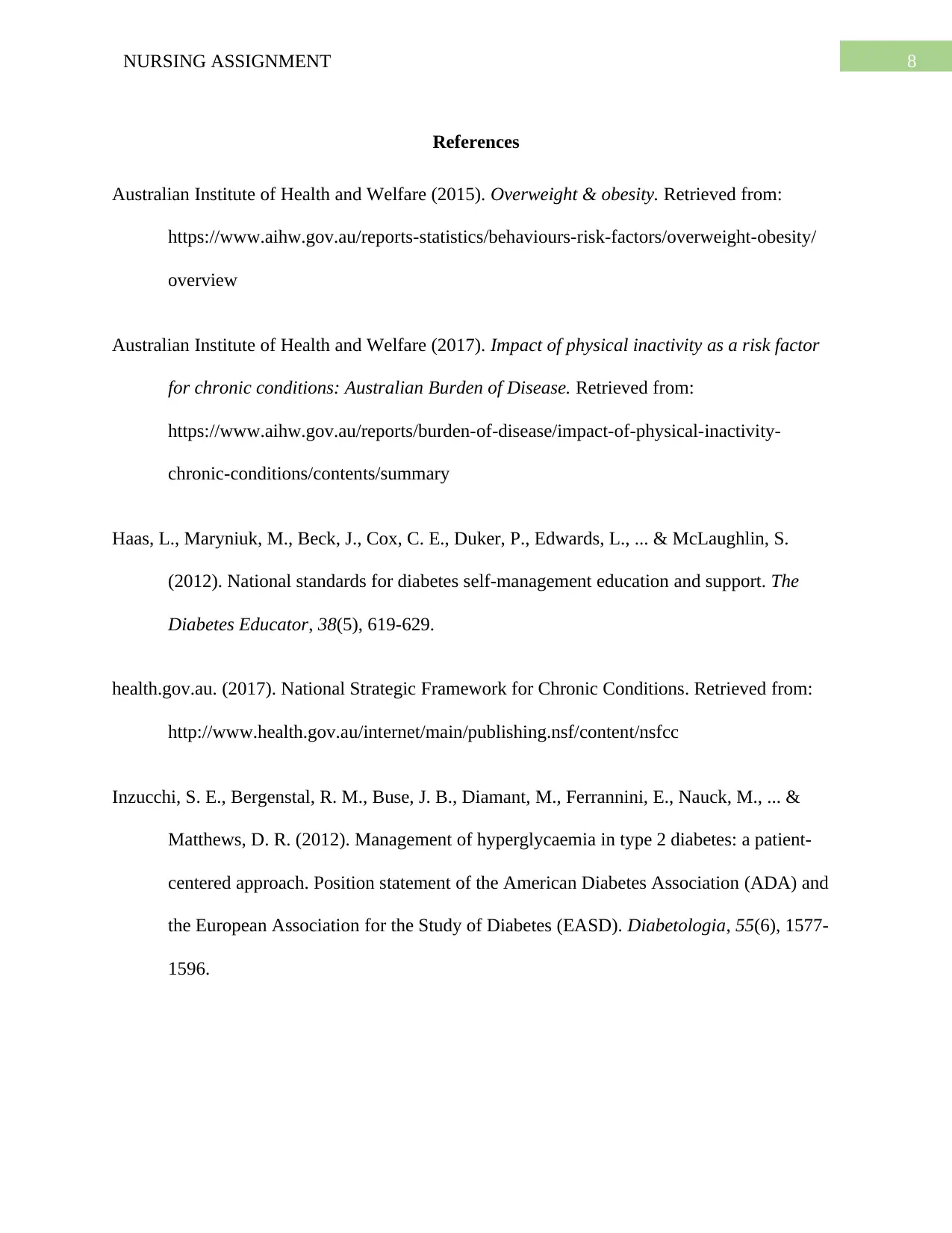
8NURSING ASSIGNMENT
References
Australian Institute of Health and Welfare (2015). Overweight & obesity. Retrieved from:
https://www.aihw.gov.au/reports-statistics/behaviours-risk-factors/overweight-obesity/
overview
Australian Institute of Health and Welfare (2017). Impact of physical inactivity as a risk factor
for chronic conditions: Australian Burden of Disease. Retrieved from:
https://www.aihw.gov.au/reports/burden-of-disease/impact-of-physical-inactivity-
chronic-conditions/contents/summary
Haas, L., Maryniuk, M., Beck, J., Cox, C. E., Duker, P., Edwards, L., ... & McLaughlin, S.
(2012). National standards for diabetes self-management education and support. The
Diabetes Educator, 38(5), 619-629.
health.gov.au. (2017). National Strategic Framework for Chronic Conditions. Retrieved from:
http://www.health.gov.au/internet/main/publishing.nsf/content/nsfcc
Inzucchi, S. E., Bergenstal, R. M., Buse, J. B., Diamant, M., Ferrannini, E., Nauck, M., ... &
Matthews, D. R. (2012). Management of hyperglycaemia in type 2 diabetes: a patient-
centered approach. Position statement of the American Diabetes Association (ADA) and
the European Association for the Study of Diabetes (EASD). Diabetologia, 55(6), 1577-
1596.
References
Australian Institute of Health and Welfare (2015). Overweight & obesity. Retrieved from:
https://www.aihw.gov.au/reports-statistics/behaviours-risk-factors/overweight-obesity/
overview
Australian Institute of Health and Welfare (2017). Impact of physical inactivity as a risk factor
for chronic conditions: Australian Burden of Disease. Retrieved from:
https://www.aihw.gov.au/reports/burden-of-disease/impact-of-physical-inactivity-
chronic-conditions/contents/summary
Haas, L., Maryniuk, M., Beck, J., Cox, C. E., Duker, P., Edwards, L., ... & McLaughlin, S.
(2012). National standards for diabetes self-management education and support. The
Diabetes Educator, 38(5), 619-629.
health.gov.au. (2017). National Strategic Framework for Chronic Conditions. Retrieved from:
http://www.health.gov.au/internet/main/publishing.nsf/content/nsfcc
Inzucchi, S. E., Bergenstal, R. M., Buse, J. B., Diamant, M., Ferrannini, E., Nauck, M., ... &
Matthews, D. R. (2012). Management of hyperglycaemia in type 2 diabetes: a patient-
centered approach. Position statement of the American Diabetes Association (ADA) and
the European Association for the Study of Diabetes (EASD). Diabetologia, 55(6), 1577-
1596.
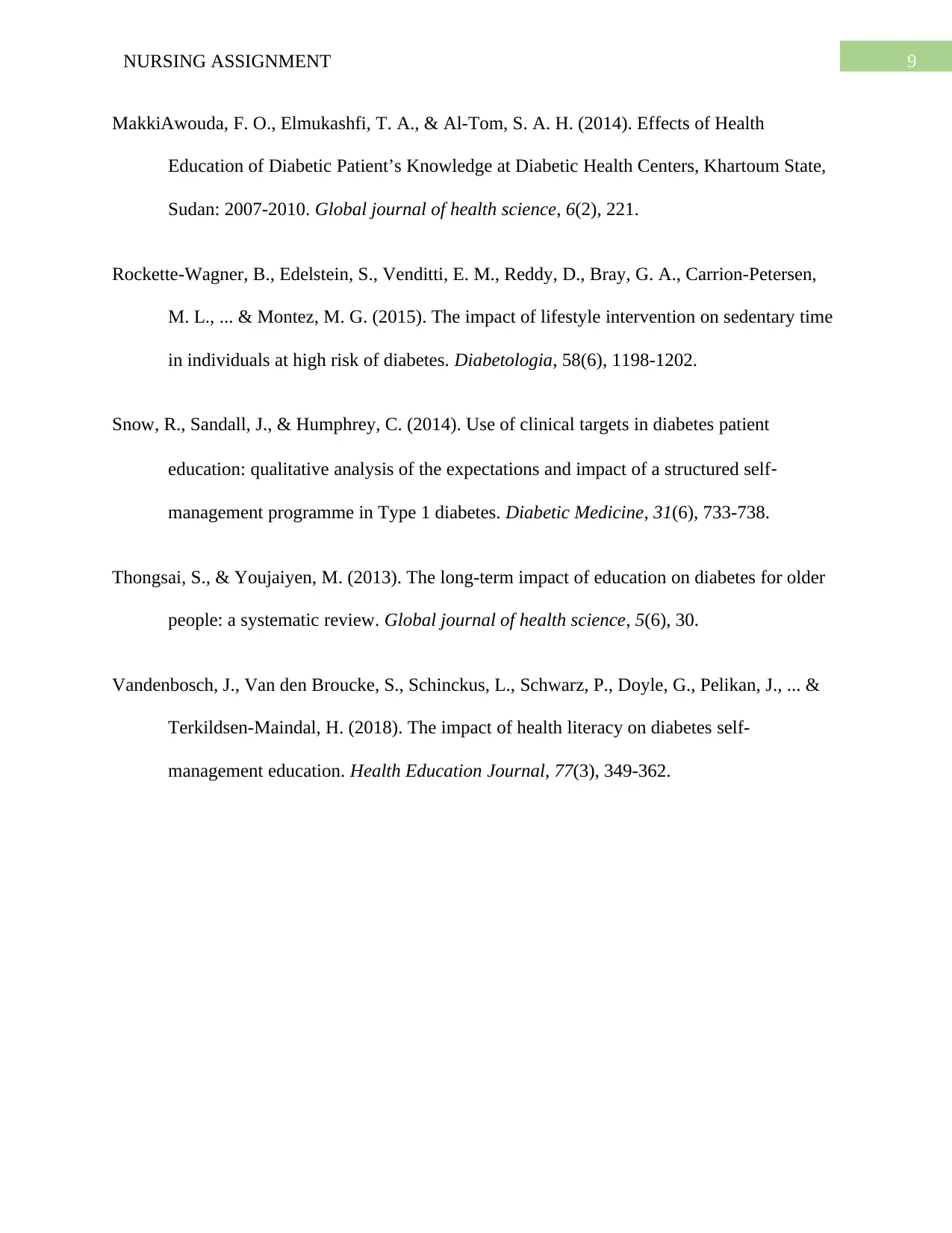
9NURSING ASSIGNMENT
MakkiAwouda, F. O., Elmukashfi, T. A., & Al-Tom, S. A. H. (2014). Effects of Health
Education of Diabetic Patient’s Knowledge at Diabetic Health Centers, Khartoum State,
Sudan: 2007-2010. Global journal of health science, 6(2), 221.
Rockette-Wagner, B., Edelstein, S., Venditti, E. M., Reddy, D., Bray, G. A., Carrion-Petersen,
M. L., ... & Montez, M. G. (2015). The impact of lifestyle intervention on sedentary time
in individuals at high risk of diabetes. Diabetologia, 58(6), 1198-1202.
Snow, R., Sandall, J., & Humphrey, C. (2014). Use of clinical targets in diabetes patient
education: qualitative analysis of the expectations and impact of a structured self‐
management programme in Type 1 diabetes. Diabetic Medicine, 31(6), 733-738.
Thongsai, S., & Youjaiyen, M. (2013). The long-term impact of education on diabetes for older
people: a systematic review. Global journal of health science, 5(6), 30.
Vandenbosch, J., Van den Broucke, S., Schinckus, L., Schwarz, P., Doyle, G., Pelikan, J., ... &
Terkildsen-Maindal, H. (2018). The impact of health literacy on diabetes self-
management education. Health Education Journal, 77(3), 349-362.
MakkiAwouda, F. O., Elmukashfi, T. A., & Al-Tom, S. A. H. (2014). Effects of Health
Education of Diabetic Patient’s Knowledge at Diabetic Health Centers, Khartoum State,
Sudan: 2007-2010. Global journal of health science, 6(2), 221.
Rockette-Wagner, B., Edelstein, S., Venditti, E. M., Reddy, D., Bray, G. A., Carrion-Petersen,
M. L., ... & Montez, M. G. (2015). The impact of lifestyle intervention on sedentary time
in individuals at high risk of diabetes. Diabetologia, 58(6), 1198-1202.
Snow, R., Sandall, J., & Humphrey, C. (2014). Use of clinical targets in diabetes patient
education: qualitative analysis of the expectations and impact of a structured self‐
management programme in Type 1 diabetes. Diabetic Medicine, 31(6), 733-738.
Thongsai, S., & Youjaiyen, M. (2013). The long-term impact of education on diabetes for older
people: a systematic review. Global journal of health science, 5(6), 30.
Vandenbosch, J., Van den Broucke, S., Schinckus, L., Schwarz, P., Doyle, G., Pelikan, J., ... &
Terkildsen-Maindal, H. (2018). The impact of health literacy on diabetes self-
management education. Health Education Journal, 77(3), 349-362.
⊘ This is a preview!⊘
Do you want full access?
Subscribe today to unlock all pages.

Trusted by 1+ million students worldwide
1 out of 9
Related Documents
Your All-in-One AI-Powered Toolkit for Academic Success.
+13062052269
info@desklib.com
Available 24*7 on WhatsApp / Email
![[object Object]](/_next/static/media/star-bottom.7253800d.svg)
Unlock your academic potential
Copyright © 2020–2026 A2Z Services. All Rights Reserved. Developed and managed by ZUCOL.





